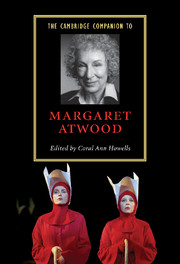Book contents
- Frontmatter
- Introduction
- 1 Margaret Atwood in her Canadian context
- 2 Biography/autobiography
- 3 Power politics: power and identity
- 4 Margaret Atwood’s female bodies
- 5 Margaret Atwood and environmentalism
- 6 Margaret Atwood and history
- 7 Home and nation in Margaret Atwood’s later fiction
- 8 Margaret Atwood’s humor
- 9 Margaret Atwood’s poetry and poetics
- 10 Margaret Atwood’s short stories and shorter fictions
- 11 Margaret Atwood’s dystopian visions: The Handmaid’s Tale and Oryx and Crake
- 12 Blindness and survival in Margaret Atwood’s major novels
- Further Reading
- Index
7 - Home and nation in Margaret Atwood’s later fiction
Published online by Cambridge University Press: 28 November 2006
- Frontmatter
- Introduction
- 1 Margaret Atwood in her Canadian context
- 2 Biography/autobiography
- 3 Power politics: power and identity
- 4 Margaret Atwood’s female bodies
- 5 Margaret Atwood and environmentalism
- 6 Margaret Atwood and history
- 7 Home and nation in Margaret Atwood’s later fiction
- 8 Margaret Atwood’s humor
- 9 Margaret Atwood’s poetry and poetics
- 10 Margaret Atwood’s short stories and shorter fictions
- 11 Margaret Atwood’s dystopian visions: The Handmaid’s Tale and Oryx and Crake
- 12 Blindness and survival in Margaret Atwood’s major novels
- Further Reading
- Index
Summary
“No place like home”
My opening phrase, taken from The Blind Assassin is, in its turn, a well-known quotation from The Wizard of Oz. In Atwood's novel, it relates to an episode from the Chase sisters' adolescence, where it is irreverent, odd, loony Laura who rewrites the sentence she heard many times from Reenie, the family housekeeper, whose language floods over with common sense, folk sayings, and popular wisdom. Laura's rewriting of “There's no place like home” - a stupid statement in her opinion - goes like this: “She wrote it out as an equation. No place = home. Therefore, home = no place. Therefore home does not exist.” The Blind Assassin destabilizes received notions of home, with their conventional meanings of comfort, security, and custom. The Chase family estate - Avilion - acts as a refuge for the whole family; it functions as a bastion to keep the world outside at bay. In this novel, however, homes are also represented as provisional; they are unstable entities, like the patrimony of the Chase family. The sense of security, stability, and reassurance that Avilion has provided for Iris and Laura crumbles at one point in the narrative. Such a precarious figuration of home parallels the representation of nation and issues of national identity. Contemporary Canada, seen through Iris's eyes, appears, much to her astonishment, an odd assortment, a multicultural mosaic of ethnicities and languages with an elusive identity, which for people of Iris's generation and background comes very much as a surprise. Crucial also in this novel is the presence of an outsider, here embodied by Laura.
- Type
- Chapter
- Information
- The Cambridge Companion to Margaret Atwood , pp. 100 - 113Publisher: Cambridge University PressPrint publication year: 2006
- 3
- Cited by

